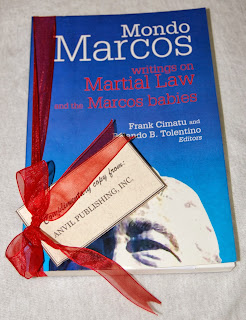Mondo Marcos writings on Martial Law and the Marcos babies, my contribution
Today 21 September an infamous day in the history of the Philippines when Martial Law was declared in 1972, four decades and a year after, another protest is scheduled against corruption of public officials on their pork barrel. What I have written while I was in Saudi Arabia (2004/2005) that became part of this anthology Mondo Marcos writings on Martial Law and the Marcos babies (edited by Frank Cimatu and Rolando B. Tolentino, published by Anvil) still rings true today particularly on corruption of public funds. I am hopeful that those corrupt officials will be sent to jail so that justice is served for all Filipino they've robed lives and future. And may this serve as a lesson to all aspiring candidates to rethink of their plans of making their position to make money.
During the first anti-pork rally held last 26 August 2013 in Luneta, I came across a former colleague, Jonathan Chua who told me that I got published. I knew I submitted when I came across a call for submission but never knew that I got chosen and the book finally made to the press in 2010. I was in South Korea that time so I was not aware of it and never got information about it.
Please buy the book and know more about Martial Law.
Finally here is my contribution to the anthology:
Ilocos, EDSA, to Saudi Arabia
A Pilgrimage of Redefining
by Pete Rahon (my surname was misspelled Rajon)
I can’t remember much of martial law. What I have in memory of Marcos and Imelda during my early days growing up in Ilocos were their glossy posters and calendars that hung so attractively on our walls. They were a much prized items in an Iloco household. But the glamor and glitter of those images faded like their ugly exit from power. An overwhelming disgust is how I view them when I finally understood the cause of their downfall. They put the country in a quagmire where it has remained stuck up to now. Their legacy is like a curse that hardly could be dispelled, its sinister phantom continues to hover and haunt. It is a horror, that is, the history and reality that is my generation. I have to bear with it, but with personal conviction and determination I will endeavor to believe that this reality is just a mirage that can be made unreal to pave way for a new reality devoid and clear of the evil spirits of the past. I believe it can be done. I am optimistic.
I was born in 1970 in Manila but spent most of my childhood in Marcos country, the solid North, the stronghold of the loyalists. He is Apo among Ilocanos, a revered figure, almost a deity. He is looked up to as a great hero. A monument was built in his hometown in Batac even while he was still alive to the consternation of the populace. A big head bust of him was erected up North (now in ruins) on a highway named Marcos.
My life in Ilocos was idyllic where I grew up with a cousin under the care of my paternal aunt. Having come from the city, I appreciated a great deal the cast and wide open spaces to roam in, mountain views and sunrises, sea views of sunsets that paint magnificent hues in the canvass of sky, moonlit and starlit nights to play hide-and-seek or listen to Chinese music after the radio dramas. So unlike my birthplace where open spaces were nonexistent, the roads, alleys, and railroad so crowded. It is for that reason I have so much fond memories of my early days in Ilocos. Those were my most cherished experiences of living so close to nature, bathing in unpolluted rivers and small lakes, my amazement with mountain dews and fogs that slowly disappear in the sunrise was magic, enjoying saluyut and dinengdeng with the fresh veggies from the backyard; afternoon rides with nuang and racing both cows and goats after pasturing them and regularly celebrating my birthdays with my favorite dudol and the regular fare sinukat that were offered first during the paluwalo. Only during summers and Christmas breaks would I have an experience of a city life when I would join my mother and brothers for vacations. I would chance upon my frequently absent father once in a while who was then a seaman. So I was so fortunate indeed to have both rustic and urban life experiences until the family finally moved and settled in Ilocos during my high school days.
Those where the happiest and most memorable days of growing days of my growing up years. But for others the events during those times are considered to be the bleakest period in the postwar history of the country. Only recently have I found out that life was not as pleasant as I remember it in my childhood. I learned it was a time when the country was experiencing and undergoing profound changes that would continue to define my existence and everyone else’s. I only came to appreciate much of Marcos’s undoing eighteen years after. My involvement with a student organization made me realize the real score in his governance. It caused me to frown at the political stand of most Ilocanos and dislike my relatives’ loyalist price. It made me aware of the plight and destitution of the country. This led me to commit to social transformation, working for social development with a nongovernment organization (NGO) where I have spent ten years of my most productive and creative life. With pride I was able to serve peasants, fisherfolks, rural women and farm workers in their effort to coalesce for agrarian reform; assisted community organizers addressing issues like child labor, urban poor housing, peace and development initiatives of Moro National Liberation Front (MNLF), environment and sustainable development, women workers rights in economic zones and to cap it all the most exciting and meaningful of all experiences was being part of EDSA 2 that toppled Erap’s regime including those numerous rallies where I became part of a street theater group that conducted ritual dances, invocations and street plays aside from the regular secretariat work – food brigade at the EDSA Shrine. And at present I am here in Saudi Arabia on a self-imposed sabbatical to play another role and experience being a migrant worker.
Way back in college, I came across buzzword such as corruption, cronies, ill gotten wealth, salvaging, assassination, etc. They were a constant barrage from TV, radio, news headlines, and sometimes dinner table conversations that created an eerie ambience of negativities. Corruption was more than a dreadful Marcos legacy. It was a culture that we see, taste, feel, hear and smell all around us. It came in various forms, guises, degrees, and levels and I am at a loss whether to call those offenders halang ang kaluluwa or zombies.
The Iloco term naan-anungan comes handy to describe the conditions of some countrymen who seem not able to shake off the ghost that Marcos left. The evil of a corrupt official is being embodied by most Filipinos. They said in Africa it takes a community to raise a child, but in the country it takes a nation to sustain a president like Marcos. A dictator would never rise up to power without ardent supporters, devoted believers and zealot followers. There won’t be any of those Pol Pot Khmer Rouge army, neo-Nazi fanatics, suicidal cult members, or terrorist gangs.
Why not twenty years of an autocratic rule? It is possible when in fact we have unrelentingly supported colonizers for several hundred years. I always believe that our ancestors, parents, relatives or friends if they were not victims would be an accomplice to crimes or associate of offenders that historically made us a county and continue to survive us a nation. Our history is replete with episodes and stories of treachery and betrayal. The aftermath of any political upheavals are balimbing who would again incite rebellion and stage coup d’etat since they would want to hang to powers. And where are they now – back onto the same corridors of powers.
The history of the Marcoses were to be as lustrous and bright as it used to be when I admired their portraits in my child’s eye. Toward my adult life I saw them fade and wear off or become eaten by termites, that in their degraded and ghoulish condition ended up being thrown out. They said time is the judge of history of mankind. And I believe it is high time for a final verdict on Marcos for all to agree. And finally seal the coffin and bury him in a literal sense with our bangungot, where past will be past. Where I could also put to a rest a generation ascribed to me.
I could only pray for forgiveness. I could only wish for healing. I could only desire that the lessons was learned. I could meditate for peace so that it may so reign in the heart, mind, and soul of all Filipinos. And I envision change and real transformation happening. I am positive it will happen. So we can continue and move on to pleasant pilgrimages.
Related online posts (write ups/reviews):
http://globalnation.inquirer.net/columns/columns/view/20101225-310926/Mad-About-Makoy
The diverse collection, dripping with different styles and tones, is more an ark than a time capsule, as readers are able to see these memories and meditation in the bright light of today. The resulting effect is not mere nostalgia, but informative in the way that the Marcosian era has left lasting effects on the Filipino psyche but the effects were most evident in the voices of the Filipinos who were defined by growing up in the 1970s and 80s. In that sense, the children of the 90s and beyond don't really know what they're missing.
But we do, and the two volumes of Mondo Marcos signify the martial law babies' decision not only to express their feelings of that era, but also to assign meaning to them. For those who came late to the New Society party, Mondo Marcos is a look back to the past, to what already feels like alternate parallel reality. For those who are the denizens of those times as well as the target audience for the series, Mondo Marcos reminds us all that we have remembered, even as it reminds us that we won't ever forget.
The short stories are quite good; poignant, highly visual, charged emotionally, nostalgic but it's really the essays that should really pull one in, these are actual accounts (well, recounts) of what people went through in that most interesting of times. These are individuals, people who fought, or merely strove to survive. If nothing else than for their sake one must read this book.
So, highly recommended? Absolutely. A must read? Extremely so. Will you enjoy it? Depends on which side of the fence you're at, but (I think and surely do hope that) even the most rabid Marcos Loyalist will find it hard not to sympathize with the people in these stories.
Whichever the case, I'm pretty sure I'll be buying the Filipino edition too for the same reason and because it has an entirely different set of writers, with some names vaguely familiar to me. But I wish Anvil just published one thick book with everyone in it.
Did I say this was my first time to attend a book launch by Filipino authors? And that I came in uninvited?
I recommend Mondo Marcos highly. These books and the works they contain are crucial historical and personal comments to the ongoing Marcos story and legacy, from writers who were born during martial law or grew up during that time.
mtv
flickr



Comments